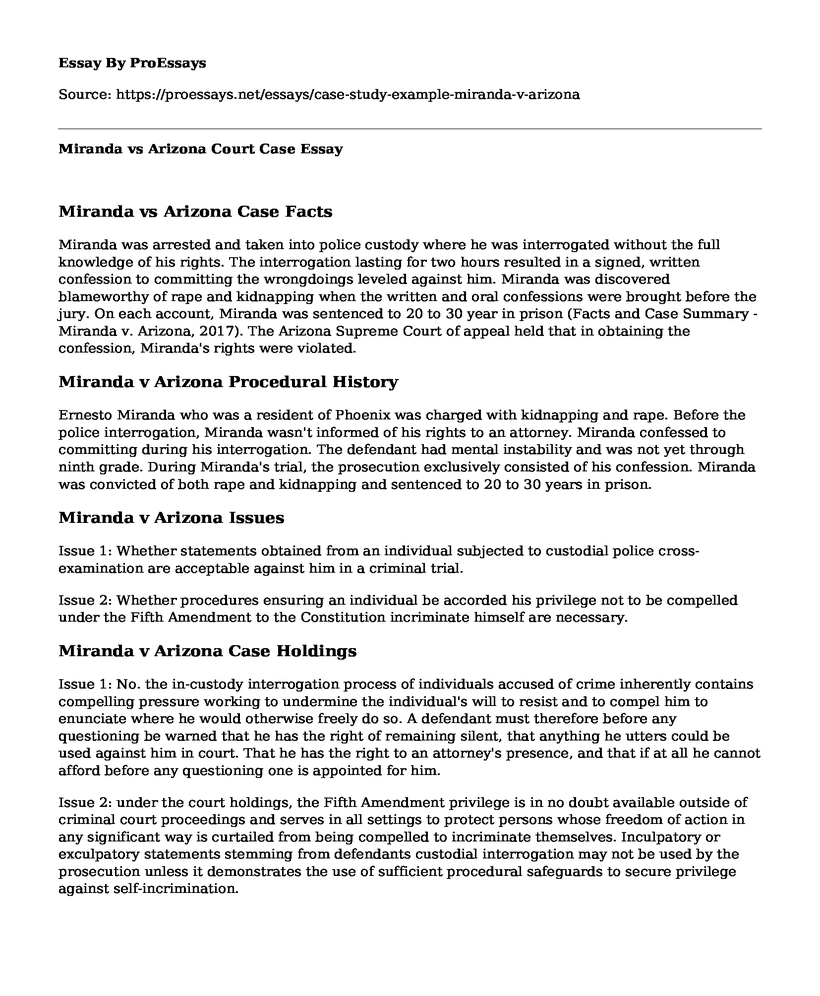Miranda vs Arizona Case Facts
Miranda was arrested and taken into police custody where he was interrogated without the full knowledge of his rights. The interrogation lasting for two hours resulted in a signed, written confession to committing the wrongdoings leveled against him. Miranda was discovered blameworthy of rape and kidnapping when the written and oral confessions were brought before the jury. On each account, Miranda was sentenced to 20 to 30 year in prison (Facts and Case Summary - Miranda v. Arizona, 2017). The Arizona Supreme Court of appeal held that in obtaining the confession, Miranda's rights were violated.
Miranda v Arizona Procedural History
Ernesto Miranda who was a resident of Phoenix was charged with kidnapping and rape. Before the police interrogation, Miranda wasn't informed of his rights to an attorney. Miranda confessed to committing during his interrogation. The defendant had mental instability and was not yet through ninth grade. During Miranda's trial, the prosecution exclusively consisted of his confession. Miranda was convicted of both rape and kidnapping and sentenced to 20 to 30 years in prison.
Miranda v Arizona Issues
Issue 1: Whether statements obtained from an individual subjected to custodial police cross-examination are acceptable against him in a criminal trial.
Issue 2: Whether procedures ensuring an individual be accorded his privilege not to be compelled under the Fifth Amendment to the Constitution incriminate himself are necessary.
Miranda v Arizona Case Holdings
Issue 1: No. the in-custody interrogation process of individuals accused of crime inherently contains compelling pressure working to undermine the individual's will to resist and to compel him to enunciate where he would otherwise freely do so. A defendant must therefore before any questioning be warned that he has the right of remaining silent, that anything he utters could be used against him in court. That he has the right to an attorney's presence, and that if at all he cannot afford before any questioning one is appointed for him.
Issue 2: under the court holdings, the Fifth Amendment privilege is in no doubt available outside of criminal court proceedings and serves in all settings to protect persons whose freedom of action in any significant way is curtailed from being compelled to incriminate themselves. Inculpatory or exculpatory statements stemming from defendants custodial interrogation may not be used by the prosecution unless it demonstrates the use of sufficient procedural safeguards to secure privilege against self-incrimination.
Miranda v Arizona Case Brief Reasoning
The Supreme Court had the following ruling after the defendants appealed in 1966.
Miranda's confession according to the court could not be introduced by the prosecution in a criminal trial as evidence since the police had in the first place failed to inform Miranda against self-incrimination and of his rights to an attorney. The duty of the police to give these warnings compelled by the Constitution's Fifth Amendment, (McBride). The Fifth Amendment's insurance as held by The Supreme Court against self-implication is accessible in all settings. Unless certain procedural safeguards were in place, statements arising from a suspect's custodial interrogation may therefore not be used.
Miranda v Arizona Court Decision
The Supreme Court overturned the Supreme Court of Arizona's judgment in the Miranda case. The Court overturned Miranda's conviction because his confession was unconstitutionally admitted at trial since he was not afforded constitutional rights to an attorney and the rights in the face of widespread ignorance of the law.
Miranda v Arizona Case Brief Comments
The Supreme Court, in this case, did not at any point in Miranda refer to the warnings as constitutional rights. The court acknowledged not the warning requirement by the Constitution, disclaimed any intention to create a constitutional straightjacket, warnings were referred to as procedural safeguards, and invited the states and Congress to develop their own safeguard to [protect] the privilege.
References
Facts and Case Summary - Miranda v. Arizona. (2017). United States Courts. Retrieved 7.
June 2017, from http://www.uscourts.gov/educational-resources/educational-activities/facts-and-case-summary-miranda-v-arizona
McBride, A. (2017). The Supreme Court. Expanding Civil Rights. Landmark Cases.
Miranda v. Arizona (1966) | PBS. Pbs.org. Retrieved 7 June 2017, from http://www.pbs.org/wnet/supremecourt/rights/landmark_miranda.html
Cite this page
Miranda vs Arizona Court Case. (2021, Jun 24). Retrieved from https://proessays.net/essays/case-study-example-miranda-v-arizona
If you are the original author of this essay and no longer wish to have it published on the ProEssays website, please click below to request its removal:
- Adolescent Development and Judicial System
- Research Paper on Health Politics
- Research Paper on Prison Privatization
- An Analysis of Walt Disney's Social Performance: Environment and Human Rights
- Essay Example on Retributive Desert & Strict Liability: Punishing Beyond Culpability?
- Essay Sample on The Role of Courts in Our World
- Right to Justice: Affirming Equivalent Access for All - Essay Sample







